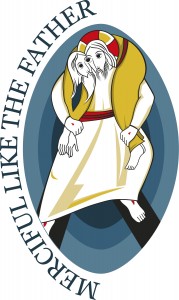 In the 6th Chapter of the Gospel according to St. Luke, Jesus gives what has been called the “Sermon on the Plain.” Like the “Sermon on the Mount” in St. Matthew’s Chapter 5 to 7, St. Luke lays out the richness of Jesus’ teaching. One small verse contains the theme Pope Francis selected for the Jubilee Year of Mercy, which begins this week. Right after Jesus speaks of His heavenly Father being good to “the ungrateful and the wicked,” is: “Be merciful as your Father is merciful.”
In the 6th Chapter of the Gospel according to St. Luke, Jesus gives what has been called the “Sermon on the Plain.” Like the “Sermon on the Mount” in St. Matthew’s Chapter 5 to 7, St. Luke lays out the richness of Jesus’ teaching. One small verse contains the theme Pope Francis selected for the Jubilee Year of Mercy, which begins this week. Right after Jesus speaks of His heavenly Father being good to “the ungrateful and the wicked,” is: “Be merciful as your Father is merciful.”
Jesus in these few words brings us to the path of mercy. It always involves two steps. We are called to be merciful with others but first experience, as Pope Francis says, “…a living experience of the closeness of the Father, whose tenderness is almost tangible.”
Our Holy Father goes on to explain: “We need constantly to contemplate the mystery of mercy. Mercy: The word reveals the very mystery of the Most Holy Trinity. Mercy: the ultimate and supreme act by which God comes to meet us. Mercy: the fundamental law that dwells in the heart of every person who looks sincerely into the eyes of his brothers and sisters on the path of life. Mercy: the bridge that connects God and man, opening our hearts to a hope of being loved forever despite our sinfulness.” (Misericordia Vultus, n 2)
This is not a year for some quick act of mercy fit into an already crammed schedule. No. It is a call for a pilgrimage – a journey of mercy. We Catholics, being so down to earth, always seem to have some external action that accompanies and makes real any internal conversion. So our year begins with a journey through a door. This Sunday I will bless and walk through two such doors – one at our Cathedral in Louisville and the other at the Basilica of St. Joseph Proto-Cathedral in Bardstown. This pilgrimage will lead me to join other priests at the Passionist Monastery in Louisville for a Holy Hour and opportunity for the Sacrament of Reconciliation on Wednesday, December 16.
Mercy and conversion go together. Jesus, after showing mercy in the Gospels, always seemed to say, “Now go and sin no more.” I have seen this dynamic alive more frequently in recent years. The Men’s Conference and the Women’s Conference are two great examples. There seems to be more and more experiences of God’s great mercy as participants go to confession and begin again.
Mercy is also about taking a step to invite those who have been identified as distant from Christ and His Church. There are many reasons why Catholics leave the Church: they may have drifted away or experienced a marriage difficulty, a hurtful situation, overwhelming circumstances in life, disagreements about Church teaching, or disappointment in a person or parish. This “Catholic Connection” process is simple: in a confidential way, a parishioner identifies a family member or friend who might appreciate an invitation to come back. A respectful letter will be sent in January to those whose names we have received inviting them to listening sessions in February and offering any other assistance needed. Thus through this process, we will reach out, listen, ask forgiveness if there has been a wrong, and welcome back. If you know someone who might benefit, let us know by going to www.archlou.org/welcomeback.
The beauty of this great idea of Pope Francis’ is that the merciful Father will always lead us more deeply into the mystery of mercy, which is what God’s love shown to imperfect and sinful people like us humans looks like. “God so loved the world that He gave His only Son that whoever believes in Him may not die but may have eternal life.” (John 3:16) And without fail, Jesus will always lead us to a life overflowing with mercy in our dealings with others.
In the early 1980s, I recall reading about the mercy of God in St. John Paul II’s encyclical, Dives in Misericordia (Rich in Mercy Ephesians 2:4) and then experiencing the 2nd Sunday of Easter as “Divine Mercy Sunday.” Now that gift of mercy is bridged by Pope Francis whose motto “Miserando atque eligendo” recalls the merciful look of Jesus as he called the tax collector Levi, who having experienced Christ’s mercy then became the great apostle and evangelist, St. Matthew. Thus, in Advent we pass through the Door of Mercy and receive the healing Sacrament of Reconciliation so that together we might be instruments of God’s mercy to others.



